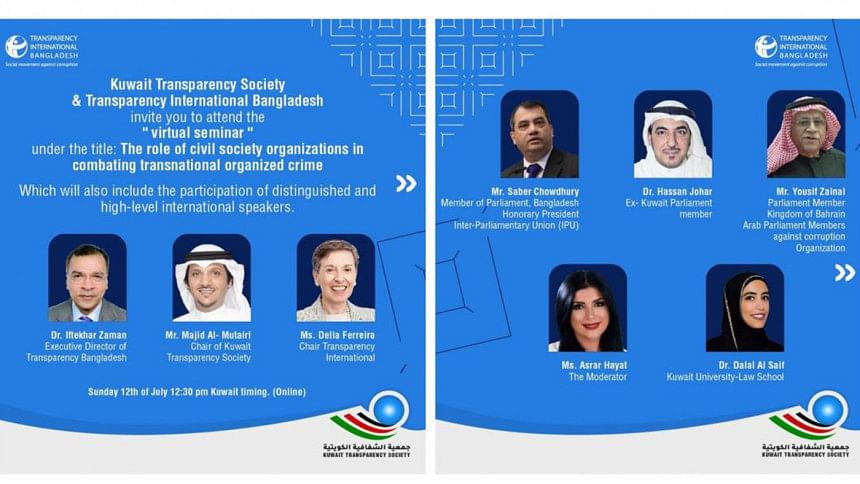MP’S Arrest in Kuwait: Expatriates may suffer the fallout

The arrest and trial of a Bangladeshi lawmaker in Kuwait on charges of human trafficking, money laundering and bribery is damaging the reputation of Bangladesh's politics, society and the people as a whole, Transparency International Bangladesh has said.
It may affect the bilateral relations between Bangladesh and Kuwait, as well as the reputations of the expatriates working in other countries, the anti-corruption watchdog observed.
"Bangladeshi migrants in Kuwait may face job losses and repatriation," TIB Executive Director Iftekharuzzaman said at a webinar titled "Role of Civil Society in Combatting Organized Crimes," jointly organised by the Kuwait Transparency Society (KTS) and TIB yesterday.
Shahid Islam Papul, the lawmaker from Luxmipur-2, was arrested by Kuwait CID on June 6 and sent to jail after being interrogated by Kuwait's Public Prosecution.
Papul co-owned Marafie Kuwaitia Group with a Kuwaiti citizen. He is the managing director and CEO of the group and is accused of trafficking of some 20,000 foreign workers, mostly Bangladeshis, in exchange for Tk 7-9 lakh each.
Migrants alleged that many of them were not provided with jobs and wages as contracted and were instead charged money for work permit renewal. He also stands accused of bribing Kuwaiti officials for contracts for his company, the recruitment of foreign workers and laundering millions of dollars.
Iftekharuzzaman said it is so embarrassing for the people of Bangladesh that a lawmaker, who should be responsible for preventing crimes, has been accused of committing heinous ones himself.
The involvement of MPs in crimes is not a unique case for Bangladesh and Kuwait, but more businessmen have been entering parliament over the decades and it has become a trend. In the first parliament after Bangladesh's independence, only about 17 percent MPs were businessmen, which increased to more than 61 percent now, he said.
"There is nothing wrong with businesspeople doing politics, but the problem arises when they are involved in corruption and criminal activities," Iftekhrzuaaman said and added that there have been a few other cases where lawmakers were found involved in such crimes.
MP Shahid Islam and his wife, also an MP, do not have a political background at all. They became members of parliament allegedly by the power of the money earned through illicit means, he said.
When Kuwait is acting against corruption in connection to Shahid, the Bangladesh government seems hesitant. The CID and the Anti-Corruption Commission here began investigation months after initial denial by the foreign ministry, he said, demanding enforcement of laws to prevent corruption.
"It is time for people to stand up against corruption. Fundamental reform is essential to separate business and politics," Iftekharuzzaman said.
Dr Hassan Johar, former member of Kuwait National Assembly, said over 90 percent of the expatriate workers have to pay high prices to get recruited in Kuwait and the money that goes to Kuwait remains out of the formal economy.
Many expatriates in Kuwait live in squalor and face deductions in pay. Such cases of labour abuse and money laundering can also affect Kuwait's international reputation and businesses, he said.
Kuwait has signed and ratified a number of international conventions and has domestic laws, but the enforcement has been weak, Dr Johar said, calling for the mobilisation of strong public opinion against corruption.
Saber Hossain Chowdhury, Bangladeshi lawmaker and Inter-Parliamentary Union Honorary president, said he does not want to pre-judge the case of MP Shahid Islam, as the Kuwait government is investigating charges against him. However, due legal procedure must be followed in doing so, he added.
He said Shahid's is not a unique case, but it is a symptom and it is important to address the root causes of corruption.
"Let's take Bangladesh-Kuwait issue as a case and study where the actual problems are. It is not only a national effort, but global actions are needed to combat corruption," Saber said.
Transparency International Chair Delia Ferreira Rubio said money laundering and human trafficking are transnational crimes that require transnational efforts. However, there are the issues of corporate secrecy whereby the money launderers remain anonymous. There should be reforms to address these issues.
She said organised crimes and money laundering facilitate various other forms of crimes, and things worsen when parliament members, who are supposed to prevent such crimes, are involved in it.
"We need legal reforms, as well as their enforcement, to stop the possibility of hiding crimes linked to money laundering," Rubio said.
Kuwait University Law school Professor Dr Dalal Al Saif, KTS Chair Majid Al-Mutairi also spoke at the programme moderated by KTS Board Member Asrar Hayat.

 For all latest news, follow The Daily Star's Google News channel.
For all latest news, follow The Daily Star's Google News channel. 



Comments